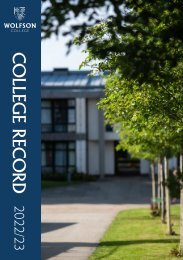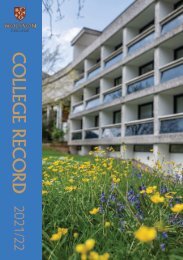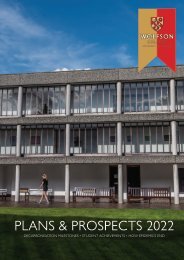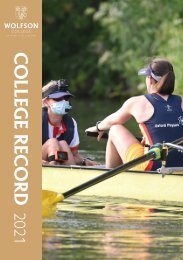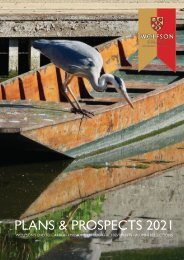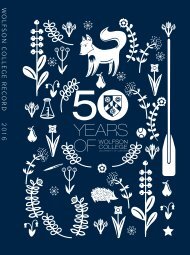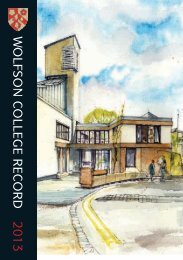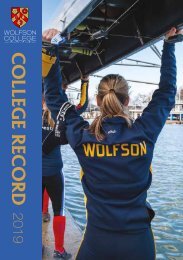Create successful ePaper yourself
Turn your PDF publications into a flip-book with our unique Google optimized e-Paper software.
history in two schools: Modern History and PPE. Brock’s tutorials brimmed with<br />
enthusiasm and encouragement, and in his nineties grateful pupils funded in his<br />
honour Corpus’s M.G. Brock Junior Research Fellowship in modern British history.<br />
Clever undergraduates affectionately and delightedly mimicked Brock’s emphatic<br />
way of speaking, which at times verged on self parody. His lectures in the late<br />
1950s on parliamentary reform sounded authoritative and incisive, and attracted<br />
a large following. In Corpus hall his strong Oxford Union-trained carrying voice<br />
needed no microphone. In seminars his pupils were an orchestra whose conductor<br />
brought out the best in his performers by honing their intellects with timely and<br />
arresting interjections, by varying his mood from serious to ironic to hilarious,<br />
and by never depreciating their contributions; like Maynard Keynes, Brock always<br />
elicited something constructive from the most callow remark.<br />
Why, then, did he forsake teaching for administration in 1966? The decision to<br />
become Vice-President and Bursar of the newly-founded Wolfson <strong>College</strong> surprised<br />
many, but Brock was now in his mid-forties, and felt that his teaching career had<br />
reached a plateau; tuition was, he thought, ‘to some extent a young man’s job’.<br />
Besides, his administrative talents were by then well-known, and as early as 1956-<br />
7 they had been advertised beyond Corpus when he was Junior Proctor. Soon a<br />
mainstay of university committees, which never bored him, he became a well known<br />
Oxford figure, often glimpsed scurrying (rather late) between commitments. In<br />
running his second college, Wolfson, his administrative partnership with its<br />
President, Isaiah Berlin, was as close as his earlier partnership with Corpus’s Frank<br />
Hardie. It was an alliance based on mutual respect and affection, and Brock kept<br />
this ‘natural anarchist’ (Brock’s phrase) administratively on the rails. Together they<br />
carried the <strong>College</strong> through the difficult period of erecting buildings, establishing<br />
a role within the University and neutralizing student radicalism through timely<br />
concession. Once described as ‘a monster of integrity’, Brock for Berlin possessed<br />
‘a kind of moral charm ... behind the unassuming exterior’. Tactful, honest,<br />
assiduous, judicious, yet unyielding when necessary, he combined reason with a<br />
humane sympathy. In 1973 he somehow also found the time to publish his one<br />
book-length scholarly publication, The Great Reform Act, which predictably showed<br />
a special interest in the ‘waverers’ during the crisis, and immediately became the<br />
30



